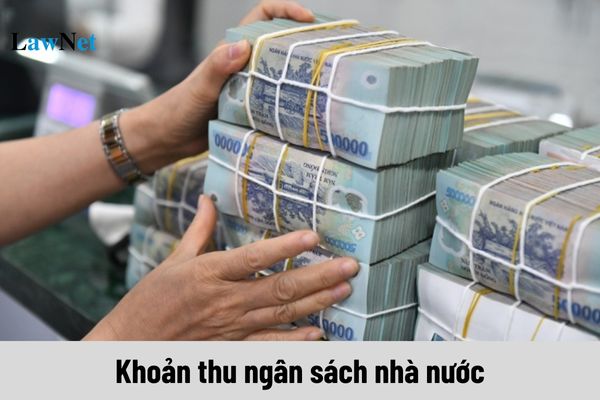What revenues are State budget revenues in Vietnam?
What revenues are State budget revenues in Vietnam?
Based on Article 2 of Decree 163/2016/ND-CP, the following State budget revenues:
(1) Taxes paid by organizations and individuals as prescribed by tax laws.
(2) Fees paid by organizations and individuals as prescribed by law.
(3) Charges collected from service activities performed by state agencies; costs are deductible if allocated expenses are covered.
(4) Charges collected from service activities performed by public service providers and state enterprises, after deducting portions retained to offset expenses as prescribed by law.
(5) State budget contributions from state economic activities, including:
- Profits shared with the host country and other revenues from oil and gas exploration and extraction activities;
- Recovering capital the State has invested in economic organizations;
- Revenues from dividends and profits shared from joint-stock companies and limited liability companies with two or more members having state capital contributions;
- Revenues from remaining post-tax profits after setting up state enterprise funds;
- Surpluses where revenues exceed expenditures of the State Bank of Vietnam;
- Recovery of state loans (including principal and interest), excluding re-lending of foreign loans of the Government of Vietnam.
(6) Contributions mobilized from agencies, organizations, and individuals as prescribed by law.
(7) Revenues from the sale of state assets, including revenues from the transfer of land use rights, changing land use purposes managed by state agencies, units, and organizations.
(8) Land use fees; land lease and water surface lease fees; sea area use fees; rental and sale of state-owned housing.
(9) Revenues from assets established as state property; fees for licensing mineral exploitation, fees for licensing water resource exploitation.
(10) Revenue from administrative violations, fines, confiscations according to law.
(11) Voluntary contributions from organizations and individuals domestically and internationally.
(12) Non-refundable aids from the governments, organizations, and individuals abroad to the State, the Government of Vietnam, or local state agencies.
(13) Revenue from financial reserve funds according to Article 11 of the State Budget Law.
(14) Other revenues as prescribed by law.

What are regulations on collection of State budget revenues in Vietnam?
Based on Article 5 of Circular 328/2016/TT-BTC as amended by Clause 5, Article 1 of Circular 72/2021/TT-BTC, the following are forms of State budget revenues collection:
(1) Collection via bank transfer:
- Collection via transfer from the taxpayer's account at commercial banks, where commercial banks debit the taxpayer's account transferring funds to the State Treasury account for budget revenue record.
- Collection via transfer from the taxpayer's account at the State Treasury, where the State Treasury debits the taxpayer's account to record budget revenue.
- Collection through electronic methods, including:
+ Through electronic tax payment services on the electronic portal of tax management agencies (tax or customs agencies);
+ Through electronic payment services of commercial banks like ATM, Internet banking, Mobile banking, POS, or other electronic payment forms of commercial banks;
+ Through intermediary payment service providers licensed by the State Bank of Vietnam for providing intermediary payment services;
+ Through the National Public Service Portal and ministerial or provincial-level public service portals.
(2) Collection in cash:
- Direct cash collection at the State Treasury.
- Cash collection at commercial banks to submit to the State Treasury account.
- Cash collection via tax authorities or organizations delegated by tax authorities to collect. The tax authority or delegated organization is responsible for collecting cash from the state budget taxpayers (excluding units, economic organizations with accounts at commercial banks as regulated in Clause 1, Article 1 of Circular 136/2018/TT-BTC on management of cash collection and spending through the State Treasury system), then deposit the entire collected amount into the State Treasury account opened at a bank as prescribed by the Law on Tax Administration, the Law on Handling Administrative Violations, and guiding documents.
- Collection through authorized organizations, individuals with authority to directly collect fines or delegated to collect fines according to the Law on Handling Administrative Violations and guiding documents.
- Commune People's Committees are authorized to collect revenues falling under the budget duties of commune level; then, procedures are to be made to deposit funds into the district-level State Treasury or into the commune's budget fund for expenditure according to prescribed policies (in case communes in remote areas lack regular transaction conditions with the State Treasury).
The organization of collection and submission for the commune budget is carried out as prescribed by the Ministry of Finance in managing commune budgets and other financial activities of communes, wards, commune-level towns.
Which revenues under the State budget are managed by tax authorities in Vietnam?
Based on Clause 1, Clause 2, Article 3 of Tax Administration Law 2019, the following revenues under the state budget are managed by tax authorities:
- Taxes
- Fees and charges as prescribed by the Law on Fees and Charges;
- Land use fees paid to the state budget;
- Land lease and water surface lease fees;
- Fees for licensing mineral exploitation;
- Fees for licensing water resource exploitation;
- Revenues to the state budget from selling assets on land, transferring land use rights as prescribed by the Law on Management and Use of Public Property;
- Revenue from penalties for administrative violations according to laws on handling administrative violations in the field of tax and customs;
- Late payment fees and other revenues as prescribed by law.


- What are the cases where the administrative penalties shall not be imposed for violations against tax procedures in Vietnam?
- What are accounting rules for licensing fees in Vietnam according to regulations in 2025?
- What incomes are subject to corporate income tax of foreign contractors in Vietnam?
- What are the conditions for personal income tax refund in Vietnam in 2025?
- Are invoices that have been changed eligible for input VAT deduction in Vietnam?
- What is the Form 01/TK-SDDPNN - Non-agricultural land use tax declaration form in Vietnam?
- Shall additional goods and services purchased during the period entitled to a 8% VAT rate in Vietnam be declared according to Resolution 142/2024?
- Shall the sea salt be exempt from value-added tax in Vietnam from July 1, 2025?
- What is the guidance on filling out Form 03-DK-TCT - Taxpayer registration application for household and individual businesses in Vietnam according to Circular 86?
- What is the Form 03-DK-TCT - taxpayer registration application for household and individual businesses in Vietnam as per Circular 86?

